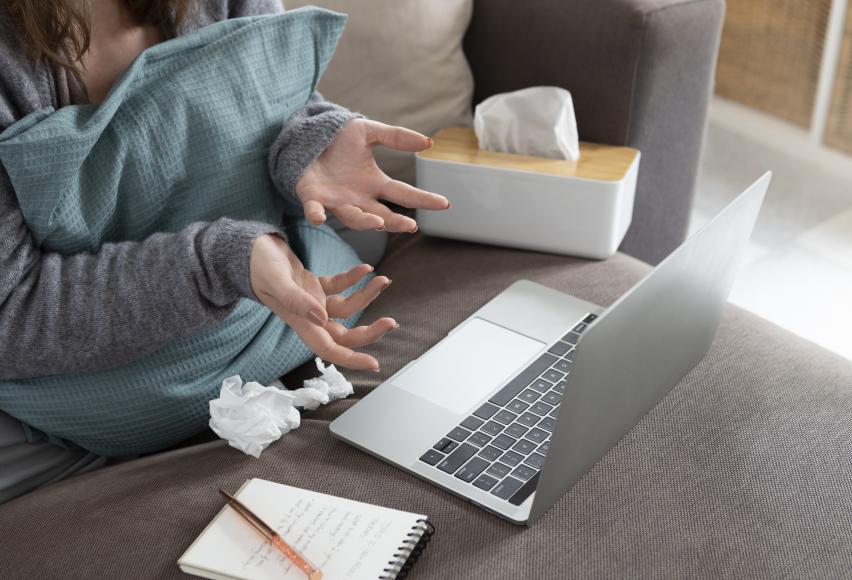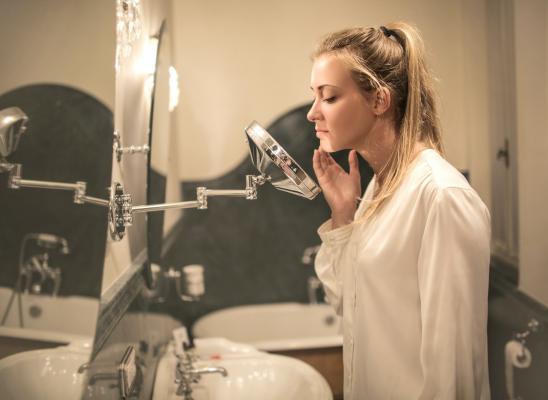The Benefits of Online Therapy for Skin Picking Disorder

Online test
Find out the severity of your symptoms with this free online test
As technology has evolved and made it easier for people to connect online, it’s not surprising that online therapy has grown in popularity too. Communicating electronically - chats, texts, and video calls – has become part of our everyday life. So, it is no surprise that seeing a therapist or healthcare provider online would make sense for a lot of people. This became even more apparent with the pandemic and its impact on in-person services. It all seems to have happened so fast!
If you’re living with a body-focused repetitive disorder (BFRB) like skin picking, you’ve probably considered or even tried some form of therapy to manage your disorder. After all, therapeutic approaches like Habit Reversal Training (HRT) for skin picking are well-supported in the literature. Traditional therapy services have been delivered in an office setting, much like traditional medical services. More recently, you’ve probably been hearing more and more about online therapy for BFRBs and wondering what that’s all about.
While behavioral treatments like HRT are effective, many people living with skin picking and other BFRBs don’t receive treatment. In some cases, it may be due to the availability of therapists who are knowledgeable in treating BFRBs. Other reasons for not seeking care include concerns of shame or stigma, a lack of knowledge about their disorder, distance from care, or cost of services.
Online therapy offers a number of benefits that in-office therapy cannot provide. What’s even more encouraging is that online therapy has been shown to be at least as effective and, in some cases, more effective, than in-office therapy for many disorders including skin-picking disorder and other BFRBs. Here’s a closer look.
What Is Online Therapy Exactly?
Online therapy is a general term for therapeutic services delivered electronically. You’ll sometimes see it referred to as telehealth or telementalhealth too. First developed in the 1960s when electronic communication was in its infancy, online therapy has grown into an accessible, effective, and increasingly popular way to receive care. Online therapy and healthcare became much more common when the pandemic, seemingly overnight, required therapists and other healthcare providers to find new ways to provide services.
Therapy sessions are provided using a secure videoconferencing platform. Just as with in-office sessions, therapy sessions are privately conducted between you and your therapist. Sessions proceed in much the same way that they would if you were sitting in your therapist’s office. You’re seeing your therapist via the screen as opposed to sitting in their office.
The Benefits of Online Therapy
Online therapy is similar in a lot of ways to what you’d expect from in-office counseling. You’re meeting with a licensed therapist who is skilled in providing therapeutic services. You can work on the same issues in much the same way.
But in-office sessions are not always the best fit for everyone. Online therapy can offer an alternative and benefits you might not expect.
- Accessibility Finding and being able to get to a therapist has long been one of the biggest barriers to seeking in-office care. For people living in remote areas or those with very few therapists nearby, getting to a therapist’s office can be a challenge and often, a barrier they can’t overcome. Online therapy closes the distance gap making services accessible from almost anywhere.
- Comfort Not everyone is comfortable with the idea of leaving home or going to an office. Online therapy allows you to be in a location that you feel comfortable in, often your home. This can be especially beneficial for someone who may struggle with leaving home or be unable to do so due to illness or injury.
- Cost Online therapy in many cases is more affordable than in-office sessions. When you factor in the savings of not having to travel, take time off work, arrange for childcare or incur other expenses, seeing your therapist online can yield big savings.
- Convenience With online therapy, you have flexibility. You’re more likely to be able to arrange a session at a time that fits your busy schedule. You can avoid taking time off work or sitting in traffic trying to get to your appointment.
- Privacy Despite the increasing acceptance of mental health needs, some people worry about being seen going to a therapist’s office and the questions or judgment that can result. Online therapy allows you to control your level of privacy.
One of the worries people sometimes have is that the screen might be a barrier to the therapist getting to know them and vice versa. On the contrary, research has consistently found that the therapeutic alliance between therapist and client is actually as solid with online therapy as it is with in-person therapy. Allowing a therapist to see your home environment is an additional way to get to know you and provide useful information to help guide your treatment. They might “meet” your dog or see you attend to your little one who bursts into the room or spy your guitar in the corner and know you’re a music lover. It’s those little insights that can help to build that therapeutic connection.
Is Online Therapy Effective?
The answer seems to be a resounding yes! Numerous studies have found that online therapy, especially cognitive behavioral therapies, is as effective, and in some cases more effective, than in-person therapy. The effectiveness of online therapy has been supported for many disorders and issues including depression, anxiety, and alcohol dependency.
The findings for the effectiveness of online therapy for BFRBs like skin picking and hair pulling are equally as impressive. A newly published study found that online therapy for skin picking and hair pulling was effective in reducing picking and pulling behaviors. What’s even more encouraging is that these treatment gains were sustained over time and were still evident at a 12-month follow-up. These results are similar to other studies that have found support for the effectiveness of online therapy in treating skin picking and other BFRBs.
You Have Choices
When it comes to treatment for your skin picking, you have options. The most important factor to consider is what works best for you and your situation. Help can come in many forms. Online therapy offers you one more way to access treatment. Getting help in the way that works best for you can help get you on the path to healing.
References
1. Asplund, M., Lenhard, F., Andersson, E., & Ivanov, V. (2022). Internet-delivered acceptance-based behavior therapy for trichotillomania and skin-picking disorder in a psychiatric setting: A feasibility trial. Internet Interventions, 30. Retrieved from https://www.sciencedirect.com/science/article/pii/S221478292200080X?via%3Dihub
2. Marcks, B. A., Wetterneck, C. T., & Woods, D. W. (2006). Investigating healthcare providers' knowledge of trichotillomania and its treatment. Cognitive Behaviour Therapy, 35(1), 19-27. https://www.tandfonline.com/doi/full/10.1080/16506070510010657a
3. Gallinat, C., Moessner, M., Haenssle, H.A., Winkler, J.K., Backenstrass, M., & Bauer, S. (2019). Help-seeking attitudes and experiences in individuals affected by skin picking. Journal of Obsessive-Compulsive and Related Disorders, 23, 100483. https://www.sciencedirect.com/science/article/abs/pii/S2211364919301034?via%3Dihub
4. Berger, T. (2016). The therapeutic alliance in internet interventions: A narrative review and suggestions for future research. Psychotherapy Research, 27(5), 511-524. https://www.tandfonline.com/doi/full/10.1080/10503307.2015.1119908
5. Carlbring, P., Andersson, G., Cuijpers, P., Riper, H., & Hedman-Lagerlöf, E. (2017). Internet-based vs. face-to-face cognitive behavior therapy for psychiatric and somatic disorders: An updated systematic review and meta-analysis. Cognitive Behaviour Therapy, 47(1), 1-18. https://www.tandfonline.com/doi/full/10.1080/16506073.2017.1401115
6. Wagner, B., Horn, A. B., & Maercker, A. (2014). Internet-based versus face-to-face cognitive-behavioral intervention for depression: A randomized controlled non-inferiority trial. Journal of Affective Disorders, 152-154, 113-121. https://pubmed.ncbi.nlm.nih.gov/23886401/
7. Johansson, M., Sinadinovic, K., Gajecki, M., Lindner, P., Berman, A. H., Hermansson, U., & Andréasson, S. (2020). Internet‐based therapy versus face‐to‐face therapy for alcohol use disorder, a randomized controlled non‐inferiority trial. Addiction, 116(5), 1088-1100. https://pubmed.ncbi.nlm.nih.gov/32969541/
8. Petersen, J. M., Barney, J. L., Fruge, J., Lee, E. B., Levin, M. E., & Twohig, M. P. (2022). Longitudinal outcomes from a pilot randomized controlled trial of Telehealth acceptance-enhanced behavior therapy for adolescents with trichotillomania. Journal of Obsessive-Compulsive and Related Disorders, 33, 100725. https://www.sciencedirect.com/science/article/abs/pii/S2211364922000185
Online test
Find out the severity of your symptoms with this free online test
Start your journey with SkinPick
Take control of your life and find freedom from skin picking through professional therapy and evidence-based behavioral techniques.
Start Now



